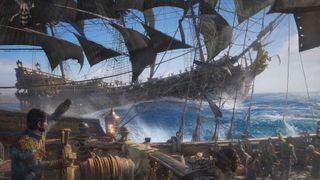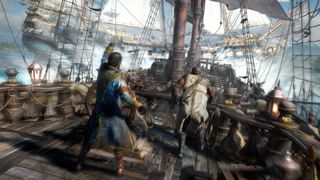
As someone who will go to his watery grave loving a shanty and still being delighted by the term ‘poop deck’, I thought Assassin’s Creed: Black Flag was easily the best game in the series. As did seemingly everyone else. The following games, Unity and Syndicate, were shorn of all the pirate stuff, and felt pale and dull in comparison. So much so that the Assassin’s series took a year off, only re-emerging at this year’s E3 in the form of the Egyptian-flavoured Origins.
But given that Assassin's' whole thing is time hopping from one evocative historical era to the next, I guess Ubisoft thinks it can’t just say “Yo, ho, ho, we’re heading back to the same setting” yet. Which means no Black Flag 2. Instead we get Skull & Bones, which was also announced at E3 this week. Developed by Ubisoft Singapore, the game is a multiplayer spin-off of the ship-to-ship combat from Black Flag, and I got to play a couple of rounds on PC at the Ubisoft booth.
The game type shown at E3 is a loot hunt which pitches four ‘Cutthroat’ ships against four ‘Raiders’. But before that, we got a tutorial which included how to trim sails correctly (Skull & Bones’ ships effectively have two speeds: full for closing on a target fast, or trimmed for turning slowly but tightly), and basic cannon aiming (rotate the camera to port or starboard, ADS, unleash a broadside). With those basics mastered, battle began.
As the round starts your team has to sink as many merchant vessels as possible in order to collect gold from their wreckage. Before long the two teams come into contact and the real action starts. I’d chosen a ‘Bruiser’ class ship with a powerful ram and nimble maneuverability, encouraging an aggressive play style. The other options were ‘Marksman’, which gets bonus damage when anchored but has a fragile hull, or the Enforcer, which is slow and tanky, or whatever passes for a tank on water. (Two of my colleagues have actually already called this game World of Tanks on Water.)
Rather than any great simulation of naval strategy, Skull & Bones (at least as played by people as inexperienced as my teammates and I), seems more about charging around the sea, swinging your ship about to deliver spectacular volleys of cannon fire, and using your ram like an enraged narwhal. I was reminded, perhaps oddly, of playing Burnout 3: Takedown—only rather than nudging rival cars into concrete bollards, here you’re slamming hulls and letting rip with munitions. Either way, a successful kill is grin inducing.
The Burnout comparison also gets slightly ridiculous when you consider that manipulating wind is more of a thing in Skull & Bones than it was in Black Flag. With the wind perfectly at your back the ship’s top speed will be boosted substantially. It’s not quite ye olden NOx, but it does promise to provide an element of skill to manouevering—as I discovered when I tried to head straight into the wind and found myself ‘in irons’, or sailor speak for stalled.
Board stiff
Something of a shame is the lack of actual boarding actions. Ships have two health bars, one for each side of the hull, and depleting either of those at close proximity will bring up a boarding prompt. But unlike Black Flag, you don’t get to swing across as the skipper and start putting yourself about with a cutlass. Instead a quick cutscene plays and the ship is sunk. It’s essentially an execution move, but with a boat. Bah!
The biggest gaming news, reviews and hardware deals
Keep up to date with the most important stories and the best deals, as picked by the PC Gamer team.
I guess I get it. Ubisoft is trying to make Skull & Bones it’s own thing, and that means putting distance between it and Black Flag in terms of features, plus the not inconsiderable cost-saving of not having to create a second combat engine.

The match ends with the arrival of Pirate Hunter ships who, sickened by the senseless loss of life and our unquenchable avarice, set about trying to sink us all. At that point the remaining players need to head for an escape point, which if reached successfully will result in whatever gold is in your hold being added to the team’s total score. During this section respawning is no longer possible, which ups the stakes nicely. In fact I was particularly pleased that I was able to follow in the wake of one rival, shooting him in the aft as he fled.
Right now Skulls & Bones feels like a relatively amusing diversion, rather than the spiritual successor to Black Flag I really want. How much depth there is here—I know, I know—is likely going to hinge on how interesting the promised shared open world element is, and the amount of upgrading and customisation that can be done to your ships. (So help me I can already see the cosmetic microtransactions for a booby figurehead.) None of that stuff is on show at E3, but unless there’s substantial scope for player progression, it’s hard not to imagine Skulls & Bones could go the way of For Honor.

Which brings me back to Black Flag, a game that still feels like bottled lightning. It wasn’t just that adding sailing to the core Assassin’s Creed gameplay loop helped freshen the experience up, though that’s of course true. The beauty of Black Flag was how different, but still thematically compatible, those two types of gameplay were, enabling players to spend their time in the world according to how they were feeling. Sick of squatting in a long grass? Head back out to sea with your hearties for songs and sinkings. Missing the land again? Return to the rooftops for more story and throat slicing.
With Skull & Bones I can’t help but wonder if Ubisoft hasn’t slightly missed the point. Splicing those two wildly disparate genres was what made Black Flag special in the first place. Excerpting the sailing stuff to stand alone, however well done, seems unlikely to capture quite the same feeling of freedom. But that's for another day. For now it was good to feel the sun beating down on the Indian Ocean and the spray hitting the poop deck. Told you: always delightful.
Correction: this article originally stated that Rogue and Unity dropped Black Flag's pirate setting. Rogue was a second Assassin's Creed pirate swashbuckler; it was the most recent game, Syndicate, that also switched to a new setting.
With over two decades covering videogames, Tim has been there from the beginning. In his case, that meant playing Elite in 'co-op' on a BBC Micro (one player uses the movement keys, the other shoots) until his parents finally caved and bought an Amstrad CPC 6128. These days, when not steering the good ship PC Gamer, Tim spends his time complaining that all Priest mains in Hearthstone are degenerates and raiding in Destiny 2. He's almost certainly doing one of these right now.
Most Popular

